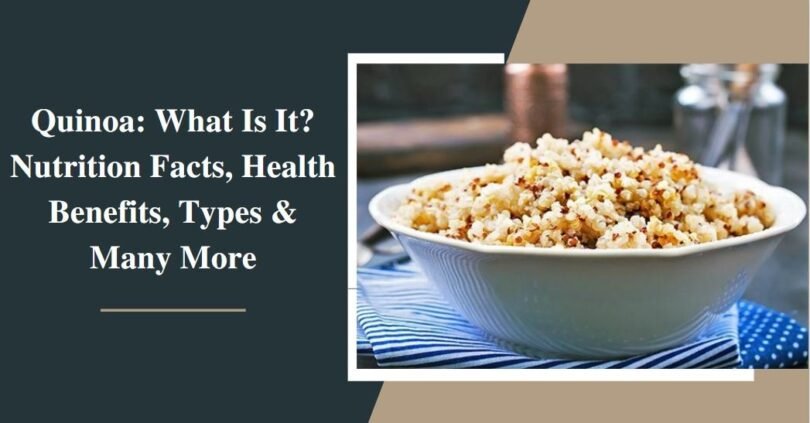Quinoa has gained in popularity over the past decade and is well-known for the nutritional value it gives. Quinoa, frequently described as a “superfood” or a “supergrain”. Quinoa contains a lot of protein, fiber, and other vitamins and minerals. It is a grain that is free of gluten, in addition to its nutritious benefits. It makes it a well-liked option for people who are health-conscious. If you are wondering to know more about quinoa this article will help you understand what quinoa is, the health benefits it offers, its types and many more. So keep on reading!
What Is Quinoa?
Quinoa, which is a seed from the Chenopodium plant and is pronounced “keen-wah,” is a gluten-free substitute for starchy grains like wheat, rye, or barley. It’s not a grain, though. Due to its nutrients similar to those of a grain, it is referred to as a pseudo-grain. Although native people in the South American have been cultivating quinoa in the Andes Mountains for more than 5,000 years, it has just recently gained popularity in the United States. It has a high protein and is a significant plant source of each of the nine necessary amino acids. Quinoa can be consumed similarly to a grain.
Good Read: Wheat or Millet: Which One Should You Have?
Types Of Quinoa-
Quinoa is available in more than 120 different types. The most common ones are white, black, and red. It’s interesting to note that each of these three varieties of quinoa has a unique cooking and taste.
White Quinoa: The most popular variety and the one with the quickest cooking times is this one. It’s also known as ivory quinoa.
Red Quinoa: Red quinoa retains its shape slightly better after cooking than white quinoa, making it a better choice for salads or other dishes where a distinctive grain is particularly desired.
Black Quinoa: Compared to the white and red types, the black variety’s taste is more distinctive and has an earthy, sweet flavor. The cooking time for this black quinoa is the longest, taking between 15 and 20 minutes to complete.
Nutrition Facts Of Quinoa-
Here is the nutritional information of quinoa before we address its health benefits. The nutritional composition for 1 cup (185 grams) of cooked quinoa is as follows:
- Protein: 8 grams
- Fat: 3.55 grams
- Calories: 222
- Carbohydrates: 39 grams
- Folate: 19% of the daily value (DV)
- Fiber: 5 grams
- Vitamin E: 8% of the DV
- Vitamin B6: 13% of the DV
- Iron: 15% of the DV
- Zinc: 18% of the DV
- Copper: 39% of the DV
- Magnesium: 28% of the DV
- Manganese: 51% of the DV
- Phosphorus: 22% of the DV
- Potassium: 7% of the DV
Health Benefits Of Quinoa-
Helps In Weight Loss
For weight loss, quinoa is an excellent food. It is a grain with low fat and no cholesterol. Due to its high dietary fiber content, it maintains satiety and helps to reduce cravings and hunger pangs. In addition to having twice as much protein as regular cereal grains, the grain also has more healthy fats, essential vitamins and minerals required for weight loss, as well as less simple sugars and more complex carbohydrates.
Good Source Of Antioxidant
Quinoa is a healthy grain that contains a lot of antioxidants. These antioxidants can aid in the body’s fight against illness. Quinoa is gluten-free and a great source of both protein and fiber. This makes it a wonderful option for individuals seeking a wheat substitute that is also healthy. Vitamin E can be found in quinoa. This antioxidant may help lower the risk of various eye disorders and some types of cancer.
Control Blood Sugar
Fiber is an indigestible component of carbohydrates that aids un satiety, prevents and relieves constipation, and is crucial for maintaining stable blood sugar levels as a result of intestines’ slower absorption into the bloodstream. Additionally, studies indicate that persons who consume a diet high in whole grains have a lower chance of getting type 2 diabetes. Quinoa can work like a whole grain despite being a seed and not a grain.
Gluten-free
Gluten-containing foods must be avoided by certain persons with gluten intolerance, such as those with celiac disease and non-celiac gluten sensitivity. People who follow a gluten-free diet must pick gluten-free substitutes for grains such wheat, barley, and rye that contain gluten. Because it is naturally gluten-free, quinoa is a wholesome option for anyone who needs to or wishes to eliminate gluten from their diet.
Support Digestion
1 cup of cooked quinoa has 21% of the daily required fiber consumption. And it is good for your digestive system. Additionally, a study discovered that consuming quinoa, buckwheat, or oats made individuals feel fuller than eating wheat or rice. In comparison to many other grains, quinoa is also easier to digest.
Promotes Heart Health
For the health of your heart, it’s crucial to maintain a healthy weight. Your risk of diabetes and heart disease can be decreased because of the fiber in quinoa’s ability to aid with cholesterol and blood sugar levels. Antioxidants included in quinoa can protect your heart and other organs from damage. Magnesium and potassium, which are both important for heart health, are also abundant in quinoa.
What Are The Potential Risks Of Quinoa?
The consumption of quinoa poses some potential health risks. Quinoa can cause allergies, which can result in symptoms like itchiness, hives, stomach cramps, diarrhea, and throat tightness. According to the HSPH, saponins, a naturally present bitter-tasting compound that coats the exterior of the seed and serves as a natural pesticide, are likely to be the cause of quinoa allergies. Generally, the reaction can be avoided by soaking the quinoa for at least 30 minutes and properly rinsing it before cooking to lower the saponin content. Having said that, be careful and consume only a tiny amount if you have known allergies to other grains but still wish to try this.
Quinoa is generally nutritious and can be included in a diet that is balanced. You should seek medical help immediately if you have any adverse effects after consuming quinoa.
Conclusion
Quinoa is a wonderful grain that is packed with nutrients and antioxidants. So if you’re looking for a grain with lots of nutrients, health benefits, and culinary potential, quinoa is a great choice. Additionally, it is gluten-free, which makes it an ideal alternative to grains like rye, wheat, and barley that contain gluten. Your blood sugar levels may be stabilized, cancer cell growth may be prevented, and the health of your heart, gut, and bones may all benefit by including this potent grain in your diet.






